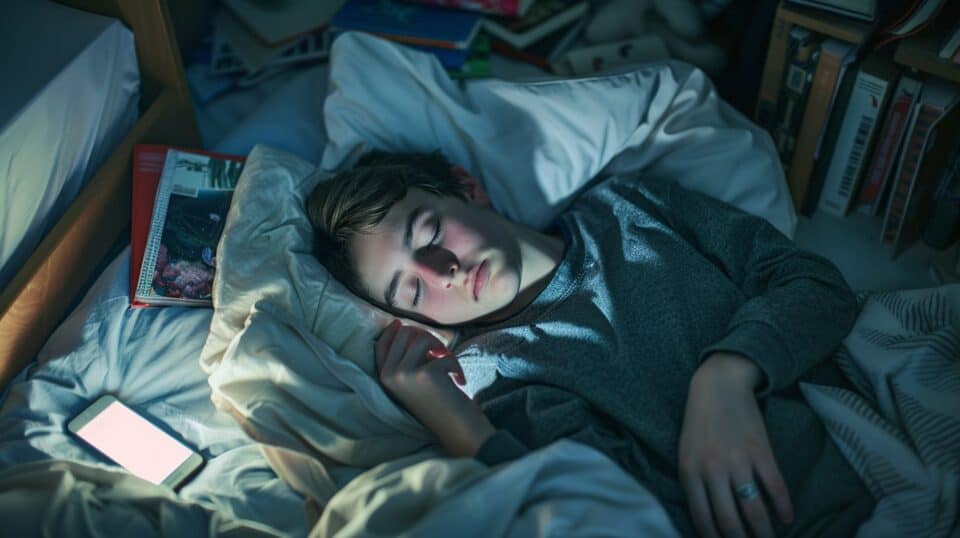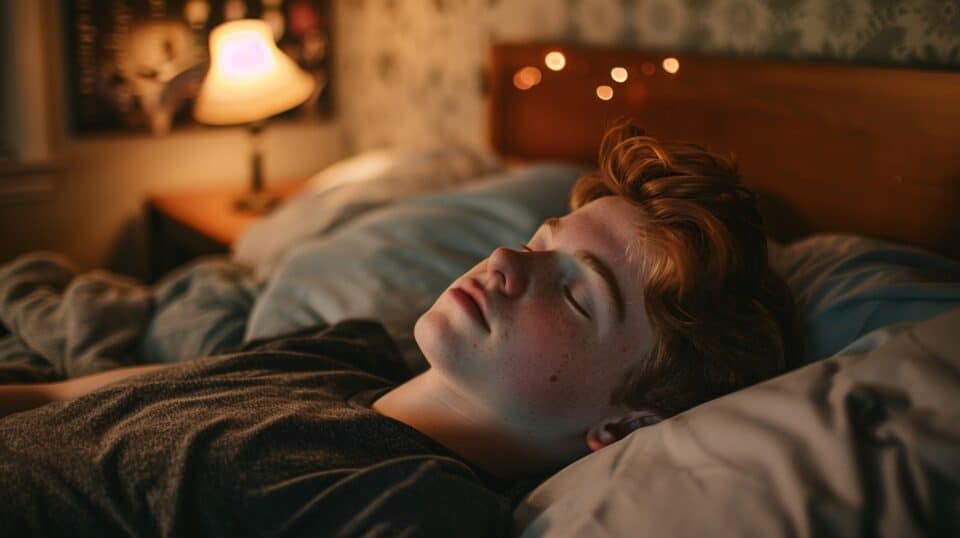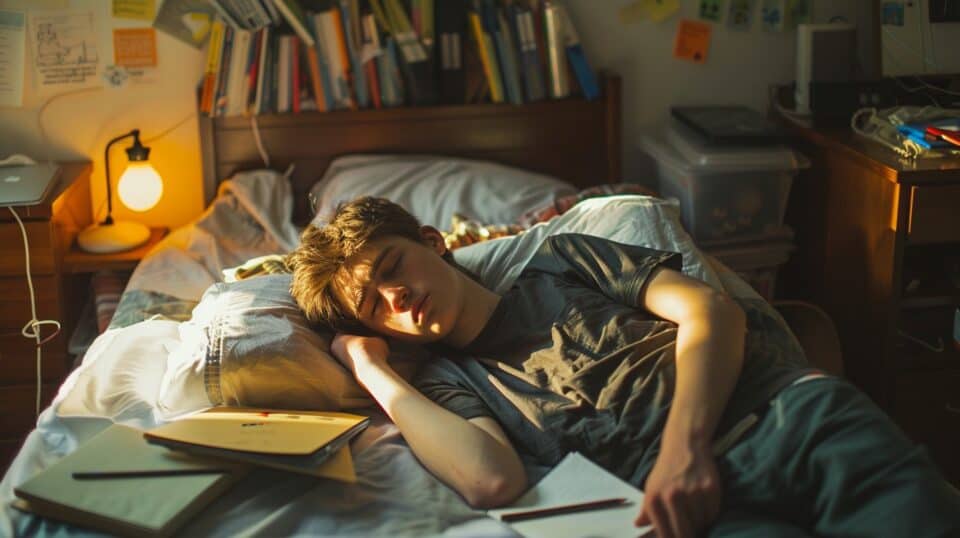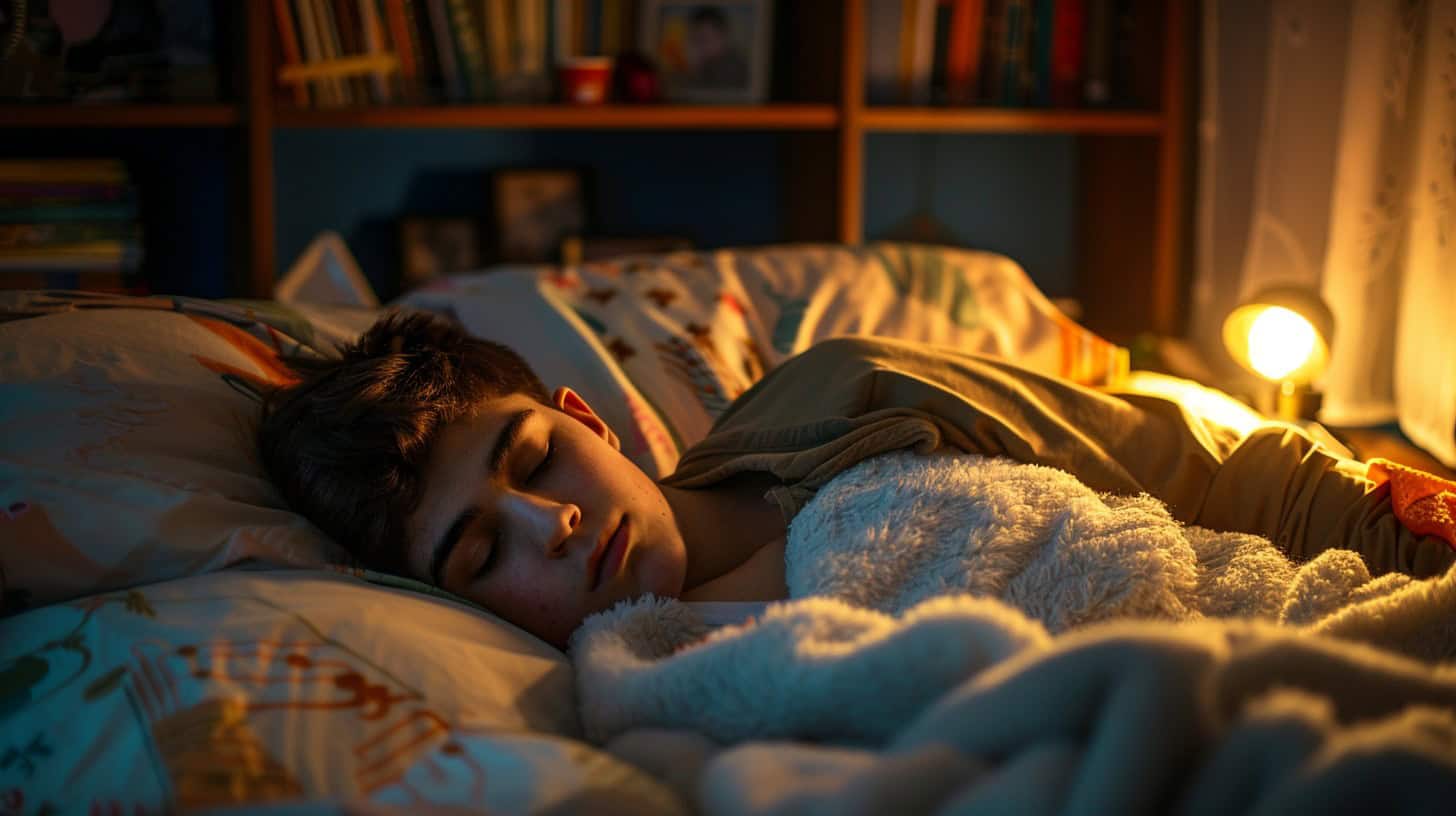Are teens getting enough rest with just 7 hours of sleep? Experts say teenagers need 8 to 10 hours each night. This article explores the impact of sleeping only 7 hours on a teenager’s health and school performance.
Keep reading to learn more.
Key Takeaways
Teens need 8 to 10 hours of sleep for good health and school success. Sleep helps their brains work better and keeps them happy.
Not sleeping enough can make teens feel sad, do poorly in school, and even get into more car accidents.
Screen time at night can stop teens from getting enough sleep. Turning off gadgets before bed helps a lot.
Setting a regular bedtime and making the bedroom quiet and dark improves sleep.
If a teenager is always tired or can’t wake up, it’s smart to talk with a sleep specialist for help.
Table of Contents
Understanding Sleep Needs for Teenagers

Teenagers need lots of sleep, more than little kids and adults. Their bodies and minds are growing fast, so sleep helps a lot.
Sleep Guidelines by Age Group
Understanding the right amount of shut-eye for each age group ensures health and well-being. Here’s a concise guide, laid out in an easy-to-digest table, focusing on how much rest is recommended:
| Age Group | Recommended Sleep (Hours) |
|---|---|
| Infants (4–12 months) | 12-16 (including naps) |
| Toddlers (1-2 years) | 11-14 (including naps) |
| Preschool (3-5 years) | 10-13 (including naps) |
| School-age (6-12 years) | 9-12 |
| Teens (13–18 years) | 8-10 |
| Adults (18+ years) | 7 or more |
From personal experience, consistent sleep within these ranges dramatically impacts daily functioning and mood. For teenagers, hitting that 8-10 hour mark is crucial, yet challenging with their busy lives. These guidelines are not arbitrary numbers but foundational for maintaining health, enhancing learning, and ensuring emotional balance. Each age bracket has its unique needs, reflecting growth stages and lifestyle changes. Specifically for teens, less than 8 hours can disrupt their cognitive and emotional development.
Remember, these hours represent a target to aim for—not just a suggestion. Making sleep a priority benefits everyone in the long run, setting a healthy foundation for both mind and body.
Lifestyle and Health Influences on Sleep
Teenagers face many challenges that can affect their sleep. Busy schedules filled with school, work, and family demands leave little time for rest. They also spend an average of 8 hours a day on screens due to smartphones, which disrupts their natural sleep patterns.
The blue light from these devices makes it hard for them to fall asleep.
Health issues like stress and anxiety add more trouble. These feelings keep teens awake at night, worrying instead of sleeping. Caffeine and nicotine are other culprits; both make sleep difficult.
Noise and light in the bedroom also prevent deep sleep, making quality rest hard to achieve.
Effects of 7 Hours of Sleep on Teenagers

Getting just 7 hours of sleep can mess with a teenager’s brain and grades. It can make them feel sad, stressed, and not ready to take on the day.
Cognitive Effects and Academic Performance
Teen sleep deprivation harms school work. Teens who don’t sleep enough struggle more with learning and get lower grades. Studies show these kids can’t focus well, think clearly, or solve problems as easily.
Sleep plays a big role in remembering what they learn, too.
Nearly 90% of U.S. high schoolers don’t get the sleep they need, making it harder for them to do well in school. Not sleeping enough affects their attention and may increase the risk of Attention Deficit Hyperactivity Disorder (ADHD).
It’s clear: good sleep equals better academic performance.
Lack of sleep should not be seen as a badge of honor, but as an obstacle to overcome for success in school.
Emotional Well-being and Mental Health
Everyone with an online Masters in School Counseling knows that sleep deeply affects mental health. Teens who get only 7 hours might face mood swings, feel more anxious, and often feel sad or depressed.
These issues can make it hard for them to focus and control their impulses. Signs like feeling moody, showing risky behavior, having trouble waking up, and falling asleep during classes reveal they are not getting enough rest.
Sleep loss also ties to serious problems later on—like depression and anxiety disorders. If a teen shows signs of tiredness all the time, feels down often, or acts without thinking, it’s a big red flag.
They need better sleep habits fast to avoid worse health troubles. Physical well-being comes next; let’s explore how less sleep can affect one’s body.
Physical Health Implications
Getting only 7 hours of sleep can lead to weight gain in teens. Their bodies need more rest to stay healthy and manage their weight properly. This lack of sleep also increases risks on the road.
Each year, sleepy drivers cause about 100,000 accidents, and young people under 25 are often at fault.
Teens not sleeping enough may face even bigger health problems. For instance, they are more likely to get sick because their bodies cannot fight off germs well when tired. Also, if they play sports, they won’t do as well without enough sleep.
A study in 2009 found that athletes in college performed better after getting extra sleep. This shows how important rest is for physical activity, too.
Common Causes of Reduced Sleep in Teenagers

Teens face a lot of pressure from school work and their busy social lives. These, along with too much time on phones and computers, keep them up late.
Academic Demands and Stress
School demands more from teens than just showing up for class. High schoolers face about 7 hours of homework each week. This workload plays a big part in why 60% of middle school and 70% of high school students don’t get enough sleep.
The stress from trying to meet these academic expectations leads directly to sleep deprivation, affecting their daily lives and overall well-being.
Nearly 90% of U.S. high school students are sleep-deprived because of study pressure.
This constant cycle creates a tough environment for teens, making it hard for them to find balance between schoolwork and rest. Stress levels go up as they try to keep up with everything—impacting not just their grades, but also their emotional health.
Next, we look at how social lives and extracurricular activities further cut into valuable sleeping time.
Social Lives and Extracurricular Activities
Moving from academic stress, teenagers also face challenges balancing their social lives and extracurricular activities. Friends and hobbies take time. Many teens join sports teams, clubs, or enjoy spending time with friends after school.
These activities are good for mental health but can eat into sleep hours.
Teens often stay up late to fit everything in their day—schoolwork, games, practice, and hanging out. They might feel they’re missing out (FOMO) if they don’t attend every event or meet-up.
This leads to less sleep. Teens need to find a balance to keep healthy while still doing what they love.
Impact of Electronic Devices on Sleep
Electronic devices harm sleep. Bright screens reduce melatonin, making it hard to sleep. Teens often use smartphones for 8 hours a day. This screen time before bed disrupts their rest.
Texting at night also gets in the way of good sleep.
It’s key to manage this electronic use for better rest. Reducing screen time helps teens fall asleep faster and improves their overall health. Now, let’s look into health risks from not getting enough sleep.
Health Risks of Inadequate Sleep for Teenagers

Not getting enough sleep can lead to serious problems for teens, like more accidents, feeling very sad or worried, and not doing well in school. Read on to learn how to help them get the rest they need.
Accident Risk and Safety Concerns
Teens with not enough sleep face a high risk of car accidents. The National Highway Traffic Safety Administration reports 100,000 crashes each year caused by drowsy driving. Surprisingly, drivers under 25 cause more than half of these accidents.
Sleep-deprived teens show slower reflexes and a higher chance of injuries.
Feeling very tired can lead to risky behaviors among teens.
Lack of proper rest increases the likelihood of engaging in dangerous acts. With 60-70% of American teenagers suffering from significant sleep debt, the connection between insufficient sleep and safety concerns is clear.
This situation demands serious attention to improve teen health and prevent tragic outcomes on the roads.
Stress, Anxiety, and Its Consequences
Moving from safety concerns, stress and anxiety emerge as critical issues. Sleep deprivation feeds into mental health conditions, magnifying stress and anxiety in teenagers. These states of mind lead directly to harmful outcomes like poor judgment and mood swings.
Specifically, a lack of sleep can push teens towards ADHD-like symptoms, making them more likely to use stimulants as a coping mechanism.
Chronic sleep deprivation goes hand in hand with severe anxiety disorders. This troubling cycle affects their academic performance, self-esteem, and social interactions—significantly altering their emotional well-being.
Stress also triggers depression in teenagers who don’t get enough rest. The bond between insufficient sleep and depressive states is undeniable; it’s clear that not sleeping enough has profound impacts on teen mental health conditions.
Depression and Sleep Deprivation
Sleep deprivation hits hard on teens’ mental health. Teens need about 8 to 10 hours of sleep each night, but many only get around 7 hours or less. This shortage can lead to severe depression and anxiety.
It’s a fact: not getting enough sleep is linked with an increase in mood disorders among teenagers. They feel sad, lose interest in activities, and struggle more with their emotions.
My stepdaughter faced these challenges during her high school years. Her sleep problems led to difficulty concentrating and feeling down most days. We saw firsthand how lack of sleep contributed to her feelings of melancholy and isolation, common signs of clinical depression in teens.
This experience drives home the importance for caregivers to recognize symptoms like excessive daytime sleepiness (EDS) and emotional instability as possible indicators of deeper issues.
Next up, let’s explore tips for better sleep in teenagers…
Tips for Better Sleep in Teenagers

Getting good rest is key for teens. Set a regular bedtime and make their room quiet and dark.
Setting a Consistent Sleep Schedule
A consistent sleep schedule helps your teen wake up fresh. Encourage them to go to bed and get up at the same times every day. Yes, even on weekends. This builds a strong sleep hygiene routine, making it easier for their body to fall asleep and wake up naturally.
Cutting out caffeine and nicotine can also improve how well they rest at night.
Getting active during the day boosts how deeply they sleep. But tell them to avoid hard exercise close to bedtime, as it might keep them awake. Naps can throw off their night’s rest too, so it’s best if they skip those afternoons snoozes.
Following these steps ensures your son or daughter gets quality shut-eye, keeping them alert in school and healthy as they grow up.
Optimizing the Sleep Environment
After setting a consistent sleep schedule, the next step is making sure the bedroom is ideal for good sleep. This means keeping the room dark, quiet, and cool. Simple changes can make a big difference—using blackout curtains to keep out light and trying white noise machines to block unwanted sounds.
Make sure the temperature is comfortable, usually between 60-67 degrees Fahrenheit. These small adjustments help everyone in the family get better rest.
Using relaxation methods before bed also helps improve sleep quality. Turning off smartphones, tablets, and computers at least an hour before bedtime reduces exposure to blue light that can keep teens awake.
Encouraging activities like reading or taking a warm bath instead supports falling asleep more easily.
Creating a peaceful bedroom layout turned nighttime into something we all looked forward to.
Managing Screen Time Before Bed
Creating a calm bedroom setting leads directly to managing evening device use. Bright screens from phones and tablets suppress melatonin, making sleep harder to come by. With 89% of teenagers owning smartphones and spending an average of eight hours a day on them, it’s clear this habit cuts into restful nights.
Texting late into the night further disrupts sleep patterns, keeping young minds alert when they should be winding down.
Limiting screen time before bed can make a big difference. Encourage teens to put away electronic devices at least an hour before bedtime. This simple change helps their bodies prepare for sleep naturally, improving how quickly they fall asleep and the quality of their rest.
By reducing exposure to screens in the evening, teenagers can enjoy better health, sharper focus in school, and stronger emotional well-being—a few changes result in significant benefits for growing kids.
When to Consult Sleep Specialists

If your teen struggles to wake up or feels tired during the day, it’s time to see a sleep expert. These experts can check for sleep issues like insomnia or sleep-breathing problems and guide you on what steps to take next.
Chronic Sleep Problems and Their Signs
Chronic sleep issues, like trouble sleeping and sleepwalking, show in many teens. They may feel very tired during the day or fight to stay awake in class. These signs point to conditions such as sleep apnea and insomnia.
A good mom knows her son growing up needs help if he shows these behaviors.
Doctors see 4% of kids with a sleeping sickness; 30% have insomnia. Mood swings, risky actions, and hard mornings are common signs. Sleep struggles can lead to mental troubles like severe depression and anxiety in adolescence.
ADHD-like symptoms might appear without enough rest. Knowing these facts helps spot problems early and seek treatment from sleep disorder specialists.
Daytime Sleepiness and Its Effects on Functioning
Moving from understanding the signs of chronic sleep issues, we see that daytime sleepiness drastically impacts daily life. This drowsiness leads to trouble focusing in school and at jobs.
Teens who face excessive sleepiness often struggle with learning new information. Their memory suffers. Mood swings become common, affecting relationships.
Daytime tiredness also increases accident risks, notably in young drivers under 25 years old. These sleepy youths might cause about 100,000 traffic accidents yearly — a clear sign of how dangerous lack of rest is for everyone’s safety on the road.
They find waking up hard and may even fall asleep during classes or while doing homework.
FAQs About How Much Sleep Teens Need
Is 7 hours of sleep enough for teens?
No, teens need more. The American Academy of Pediatrics says they should get between 8 and 10 hours each night for good health.
Why do teens need more sleep?
During the teen years, their bodies and brains are still growing. Enough sleep supports this growth, helps with learning, and keeps mood swings under control.
What happens if a teen doesn’t get enough sleep?
Lack of sleep can lead to problems like obesity, depression, lower grades in school, and even car crashes because they’re too tired.
Can poor sleep affect a teen’s mental health?
Yes, not sleeping enough can increase feelings of anxiety and depression. It makes it hard for them to manage stress.
How can teens improve their sleep habits?
They should try relaxation techniques before bed or keep a regular schedule that includes going to bed at the same time every night.
Are there any conditions that make it hard for teens to sleep well?
Yes – some suffer from things like obstructive sleep apnea or chronic insomnia, which stop them from getting restful sleep.



